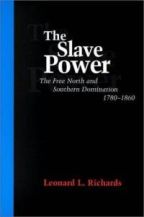
208 pages / 6.00 x 9.00 inches / 11 charts, 3 maps, 5 halftones
History / American History | Reference | Social Studies / Slavery Studies
From the signing of the Constitution to the eve of the Civil War there persisted the belief that slaveholding southerners held the reins of the American national government and used their power to ensure the extension of slavery. Later termed the Slave Power theory, this idea was no mere figment of a lunatic fringe’s imagination. It was, as Leonard L. Richards shows in this innovative reexamination of the Slave Power, endorsed at midcentury by such eminent and circumspect men as Abraham Lincoln, William Henry Seward, Charles Sumner, the editors and owners of the New York Times and the Atlantic Monthly, and the president of Harvard College. With The Slave Power, Richards reopens a discussion effectively closed by historians since the 1920s—when the Slave Power theory was dismissed as a distortion of reality, and later a manifestation of the “paranoid style” in the early Republic—and attempts to understand why such reputable leaders accepted this thesis wholeheartedly as truth and why hundreds of thousands of voters responded to their call to arms.
Through incisive biographical cameos and narrative vignettes, Richards explains the evolution of the Slave Power argument over time, tracing the oft-repeated scenario of northern outcry against the perceived slaveocracy, followed by still another “victory” for the South: the three-fifths rule in Congressional representation; admission of Missouri as a slave state in 1820; the Indian removal of 1830; Texas in 1845; the Wilmot Proviso of 1847; the Fugitive Slave Law of 1850; and more. Richards probes inter- and intraparty strategies of the Democrats, Free Soilers, Whigs, and Republicans and revisits national debates over sectional conflicts to elucidate just how the southern Democratic slaveholders—with the help of some northerners—assumed, protected, and eventually lost a dominance that extended from the White House to the Speaker’s chair to the Supreme Court.
The Slave Power reveals in a lucid and compelling way the importance of slavery in the structure of national politics from the earliest moments of the federal Union through the emergence of the Republican Party. Extraordinary in its research and interpretation, it will challenge and edify all readers of American history.
“Richards offers an effective examination of northern politics in regard to the slavery issue, and he convincingly defends the Slave Power thesis. His painstaking examination of key votes and deft portraits of political jockeying among northern Democrats add a valuable new dimension to our understanding of the politics of slavery.”—American Historical Review
“With this book, Richards breathes new life into the claim that belief in a Slave Power conspiracy was both broad and deep. . . . Richards compels us to reconsider the Slave Power seriously, and scholars of antebellum politics will have to reckon with his findings of persistent doughfacism among free-state Congressman throughout the antebellum era.”—Journal of Interdisciplinary History
“His book effectively revives a debate that is a few decades old and should be viewed as the definitive history of the Slave Power. . . . Richard does an excellent job of showing the full extent and entrenched nature of southern political domination in the early Republic that only secession and Civil War would overcome.”—North Carolina Historical Review
Found an Error? Tell us about it.